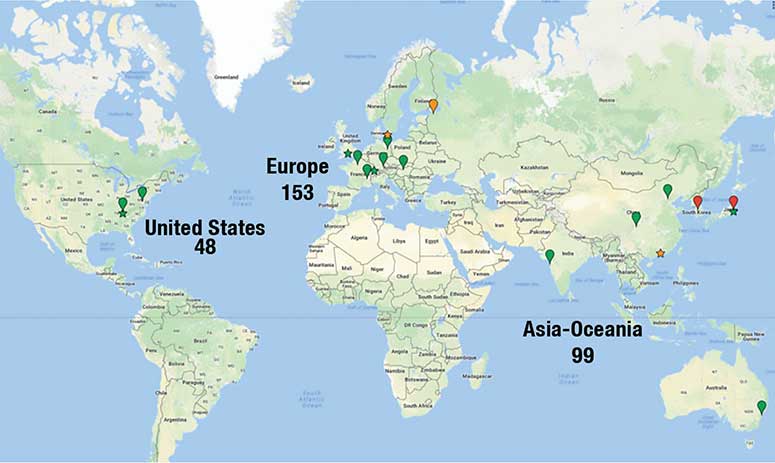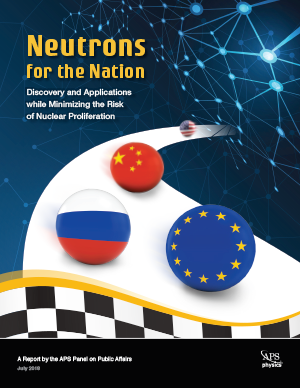Benefits of Civilian Reactors Must be Balanced with Nuclear Risks
August 8, 2018 | Tawanda W. Johnson
The United States should set a global example of reducing nuclear risks at home as it strives to reduce the spread of nuclear weapons in countries such as Iran and North Korea, according to a new APS report.

Credit: Dan Neumann (NIST)
Map of the major neutron scattering facilities worldwide and the number of neutron scattering and imaging instruments from each region in 2017. A major neutron scattering facility is defined in this report as having eight or more beam instruments and a thermal power of 10 MW or more if the source is reactor based. Pins denote reactor-based facilities and stars represent spallation neutron sources. Green, orange, and red symbols represent facilities that are currently operational, under construction, and not operational at present, respectively.
Titled “Neutrons for the Nation: Discovery and Applications while Minimizing the Risk of Nuclear Proliferation,” the report states that the U.S. must delicately balance maintaining civilian nuclear research reactors — critical to the nation’s competitiveness and scientific enterprise — while transitioning off fuel that can be used to construct nuclear weapons.
For years, civilian nuclear research reactors have been used to conduct research and development (R&D) with neutrons, probing matter on an atomic scale, and examining the behavior of materials in extreme environments.
“This report provides a good framework for dealing with what will undoubtedly be a challenge as the nation strives to maintain the benefits of civilian research reactors while minimizing the risks associated with them,” said Julia Phillips, report co-chair, former Chief Technology Officer at Sandia National Laboratories and current member of the National Science Board.
The report notes that it is possible to operate civilian research reactors using low enriched uranium (LEU) fuel, which drastically limits the nuclear proliferation risks while maintaining the integrity of R&D being carried out in today’s highly enriched uranium (HEU) facilities.
Complicating the transition from HEU to LEU: a decline in America’s global leadership in neutron R&D capabilities during the last decade as many important neutron facilities have closed. Meanwhile, other nations have developed new neutron-producing capabilities, including many that don’t require HEU fuel.
The report recommends the following to keep the U.S. globally competitive while minimizing risks associated with civilian research reactors:
- The U.S. should sharply increase its investments in neutron instrumentation development and deployment to partially compensate for the country’s dramatic decrease in neutron R&D capacity and capability in recent decades.
- The U.S. should reaffirm its commitment to the timely development and deployment of high-density LEU fuels for use in existing high-performance research reactors, both in the U.S. and around the world.
- The U.S. should initiate an effort to competitively design and build a new generation of LEU-fueled, high-performance research reactors that would satisfy all needs presently met by HEU-fueled, high-performance research reactors, as well as provide new capabilities.
The author is APS Press Secretary.
| |||||||


